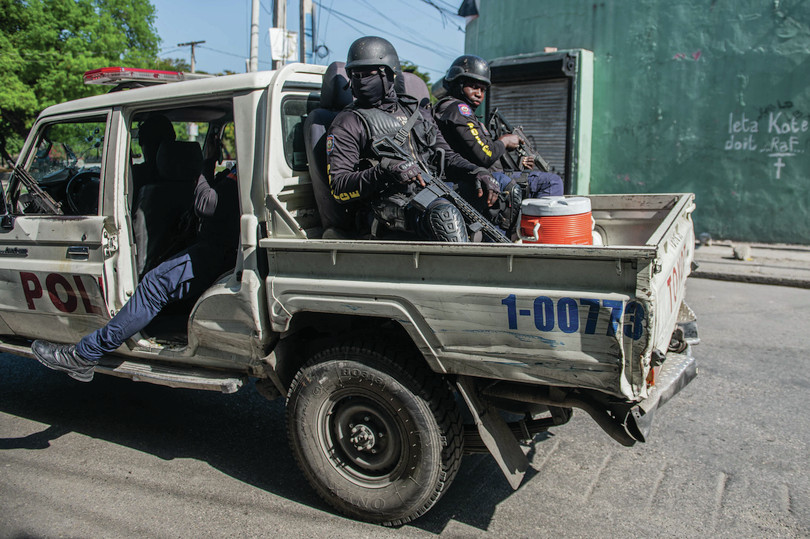The Multinational Security Support mission and the Haitian police: stuck between a rock and a hard place.
The Kenyan-led Multinational Security Support (MSS) mission is in an increasingly complicated position. With only 1 000 personnel deployed, compared to the 2 500 originally planned, its operational scope is limited.1
While the mission has so far had some victories since it deployed to Haiti last June — such as the seizure of a residence belonging to gang leader Chérizier at the end of November 2024 — the gangs have never been in a weak position.2 During the weekend of 22 February, the MSS suffered its first casualty after a gang member fatally shot a Kenyan officer while they were responding to a distress call from residents in the commune of Pont-Sondé, a commercial hub of Artibonite.3
Consequently, the mission struggles to challenge gangs’ territorial control, particularly in critical urban areas, undermining its efforts to restore order and secure vital infrastructure. The MSS mission’s challenges are also set against the backdrop of an escalating humanitarian crisis. Gangs continue to disrupt humanitarian efforts by limiting access to vulnerable populations and cutting off main supply routes, resulting in food and medical shortages, and further exacerbating residents’ suffering. Humanitarian workers have been targeted, and critical infrastructure, such as medical facilities and shelters, has been destroyed.4
During the recent attacks in Kenscoff (see story 3), Mayor Jean Massillon reported that the attackers had surrounded the area, leaving local authorities struggling to secure reinforcements to repel the assault. The attack resulted in significant loss of life and disrupted agricultural activities, as many victims were working-class individuals tending crops. Additionally, leaked information revealing that the Haitian National Police (HNP) was aware of the pending attack but allegedly chose not to act.5
What transpired in Kenscoff underscored three things. First, the serious flaws in coordination, dialogue and trust between the HNP and the MSS, but also the internal institutional weakening of the HNP, linked — in addition to exhaustion in the face of constant engagement with gangs for months — to internal fractures within the command. Second, and this stems from the first problem, the difficulties of the HNP and the MSS to deploy rapidly in different theatres of operations, particularly when these are geographically distant, and to maintain control of the territory, repel the gangs and gain ground against them. Third, the critical need for more effective intelligence gathering and timely response mechanisms within Haiti’s security apparatus. The government’s failure to act on prior warnings highlights systemic issues in coordination and resource allocation.
A sustainable solution to Haiti’s security crisis requires rebuilding the HNP into a capable and credible force. On 10 January 2025, the Haitian National Police Academy made progress when it celebrated the graduation of 739 new officers, including 213 women.6 Still, Haitian officers often face threats to their lives, receive low pay and experience poor morale. In light of increasing violence, they have demanded better protection and support. Following the fatal shooting of the Kenyan officer in February, Garry Jean Baptiste, leader of one of Haiti’s two major police unions, called on government officials to provide officers with more equipment and backup, and criticized the delay in payments and lack of financial aid for families of slain officers.7 Without systemic reform, however, it is unlikely that the HNP will be able to stand on its own as a force capable of providing security and stability.
There is still time and space for the MSS mission to make an impact if properly supported. The international community must work to balance short-term actions with long-term strategies for rebuilding Haiti’s institutions. It must also act decisively to expand the mission and bolster the HNP’s capability to reclaim territories from gang control.
Finally, the MSS and the HNP must be able to receive regular operational and tactical training, combined with the provision of intelligence on the evolution of gangs within their territories. This aspect of the operational development of national and international law enforcement agencies is sorely lacking at present. The lack of strategic planning prevents the conduct of long-term operations and the consolidation of a clear line. The public forces, in particular the MSS, seem to lack reliable information on the behaviour of the gangs, their weaponry and their tactical innovations, creating an upper hand for the criminal groups of which the latter are particularly aware. It is essential that these efforts be supported by sustained financial resources, comprehensive police reforms and long-term development strategies. Without such a multifaceted approach, Haiti’s descent into chaos will only continue.

Police patrol in Port-au-Prince, March 2025. The Haitian police force is currently losing the war against the city’s gangs.
Photo: Clarens Siffroy/AFP via Getty Images
Notes
-
Jacqueline Charles, As gangs prepare to attack Haiti’s capital, U.S. freezes critical aid for security mission, Miami Herald, 5 February 2025. ↩
-
Cyrus Ombati, Kenya, Haitian troops flatten Barbecue’s home, The Star, 25 November 2024. ↩
-
Vanessa Buschschlüter, Kenyan police officer killed confronting gang members in Haiti, BBC, 24 February 2025. ↩
-
Jacqueline Charles, Haitian gang shoots up crowded U.S. embassy van, wounding at least one employee, Miami Herald, 20 January 2025; see also Evens Sanon, Haiti’s shuttered main public hospital is set on fire in latest attack on the institution, Associated Press, 13 February 2025. ↩
-
Juhakenson Blaise, Haiti’s government know about deadly Kenscoff gang attack but did nothing to stop it, The Haitian Times, 31 January 2025. ↩
-
Guest Author and Juhakenson Blaise, Haiti’s National Police adds 739 officers to a depleted force, The Haitian Times, 13 January 2025. ↩
-
Evens Sanon, A police union in Haiti demands more protection as gang violence surges, AP News, 25 February 2025. ↩
